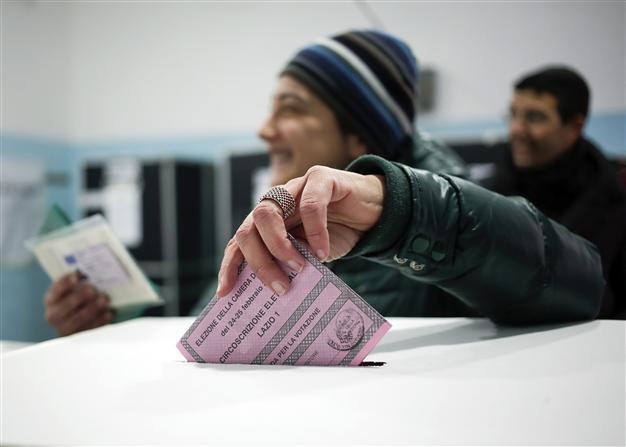Euro weakens in Asia after Italy vote
TOKYO - Agence France-Presse

REUTERS Photo
The euro's brief rally on Tuesday morning fizzled as investors flocked to the safe-haven yen after Italian elections left no clear winner, fuelling fears political instability could tip the eurozone back into crisis.The result from Sunday's poll, which stoked a euro sell-off in New York, led markets watchers to fear that Rome could backtrack on some of its recent economic reforms that have been put in place to pay down its huge debts.
"Investors were looking for a sign that Italy was going to continue along its current austerity driven path," said Chris Tedder, analyst at Forex.com in Sydney.
"Instead, Italians have sent their politicians and broader Europe a clear message that they are largely fed-up with austerity measures." The result means Italian politics is in stalemate between right and left, while new protest party the Five Star Movement, calling for a referendum on the euro, was the biggest gainer, becoming Italy's third political force with dozens of new lawmakers.
In afternoon Tokyo trade, the euro bought 120.14 yen and $1.3054 compared with 120.12 yen and $1.3065 late Monday in New York.
The single currency was down from morning trading levels in Tokyo and still well below the 124.24 yen and $1.3197 that it bought in Asia on Monday, before the election results. The dollar fetched 92.07 yen, from 91.92 yen in New York. However the greenback was well off the 94.77 yen it fetched in Tokyo on Monday as dealers banked on the yen's status as a port in the storm during economic uncertainty.
The yen had been under pressure as traders reacted to reports Monday that Japan's Prime Minister Shinzo Abe would nominate Asian Development Bank chief Haruhiko Kuroda as the Bank of Japan's new chief.
Kuroda has been a stern critic of the bank and his nomination was likely to open the door to more aggressive easing demanded by the new government, a key part of its plan to stoke the slumbering economy. Easing tends to weaken the currency.
Abe and incumbent Masaaki Shirakawa, who is to step down next month, disagreed on policy matters with the under-pressure bank governor leaving the post about three weeks before the end of his term.
The pound strengthened to $1.5189 from $1.5131, but was still down from the levels well above $1.52 before Moody's on Friday said it had stripped London of its coveted triple-A debt rating, citing weak growth and rising debt.
Dollar trade was focused on the testimony to Congress later in the day by Federal Reserve Chairman Ben Bernanke, with hopes he will clarify the bank's policy direction.
The dollar was mixed against other Asia-Pacific currencies, edging up to Sg$1.2392 from Sg$1.2390 on Monday, to Tw$29.69 from Tw$29.66 and to 1,087.85 South Korean won from 1,086.96 won.
The greenback fetched 9,711 Indonesian rupiah from 9,709 rupiah and 40.75 Philippine pesos from 40.71 pesos. It was nearly flat at 29.85 Thai baht.
The dollar weakened to 54.04 Indian rupees from 54.08 rupees.
The Australian dollar slipped to $1.0275 from $1.0281 and the Chinese yuan fell to 14.73 yen from 15.09 yen.
















